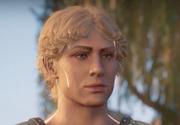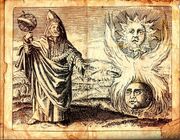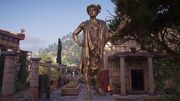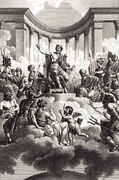Sadelyrate (talk | contribs) mNo edit summary |
PindaPixel (talk | contribs) (Small typo corrected) |
||
| (4 intermediate revisions by 2 users not shown) | |||
| Line 1: | Line 1: | ||
{{Era|Individuals|Isu}} |
{{Era|Individuals|Isu}} |
||
{{WP-REAL|Hermes}} |
{{WP-REAL|Hermes}} |
||
| + | {{Youmay|the Isu|[[Hermes (horse)|Hermes]], the 1st century BCE horse}} |
||
{{Character Infobox |
{{Character Infobox |
||
| − | |name = |
+ | |name = Hermes Trismegistus |
| − | |native = |
||
|image = ACOD Foa Hermes Render.png |
|image = ACOD Foa Hermes Render.png |
||
| ⚫ | |||
| − | |birth = |
||
| − | |death = |
||
| ⚫ | |||
|species = [[Isu]] |
|species = [[Isu]] |
||
| ⚫ | |||
| − | |database = |
||
| ⚫ | |||
| ⚫ | |||
| − | |actor = |
||
| − | |voice = |
||
| − | }} |
||
| ⚫ | |||
His beliefs and philosophies eventually influenced the foundation of an ancient religious order called the [[Cult of Hermes]]. This cult, in turn led to the birth of the [[Cult of Kosmos]]. |
His beliefs and philosophies eventually influenced the foundation of an ancient religious order called the [[Cult of Hermes]]. This cult, in turn led to the birth of the [[Cult of Kosmos]]. |
||
==Biography== |
==Biography== |
||
| + | A skillful craftsman and inventor, Hermes was noted for his technological contributions during the [[Isu Era]], in particularly the [[Wings of Hermes]], portals which served as a means of transport to higher locations. These portals were later included in the [[Sister Realms]] of [[Elysium]], the [[Underworld]] and [[Atlantis]].<ref>''Assassin's Creed: Odyssey'' – ''The Fate of Atlantis''</ref> |
||
| ⚫ | Towards the end of the |
||
| ⚫ | Towards the end of the Isu Era, Hermes attended a summit of the Sister Realms as [[Persephone]]'s representative of Elysium and her High Scientist and Engineer. There, a delegation of the Atlantean embassies presented the [[Solar Dynamics Observatory]] of Atlantis' concerns over the [[Great Catastrophe|threat of solar instability]] but, with tensions high between the realms, Hermes simply stormed off.<ref name="ACOdJoA" /> |
||
| ⚫ | Hermes survived the Great Catastrophe that brought about the beginning of the end for the Isu species wielding [[Staff of Hermes Trismegistus|a staff that granted immortality]] to its bearer.<ref name="ACOd">'' |
||
| + | |||
| ⚫ | Later, Hermes survived the Great Catastrophe that brought about the beginning of the end for the Isu species wielding [[Staff of Hermes Trismegistus|a staff that granted immortality]] to its bearer.<ref name="ACOd">''Assassin's Creed: Odyssey''</ref> Tens of thousands of years later, in the sixth century BCE, Hermes met [[Pythagoras]] and his protégé [[Kyros of Zarax]] in a remote desert. There, Hermes passed his staff onto Pythagoras, naming him his successor before disappearing.<ref name="ACPL Divine Science 2">''[[Assassin's Creed: Project Legacy]]'' – [[Divine Science: Chapter 2 – Kyros of Zarax]]</ref> |
||
===Simulated life=== |
===Simulated life=== |
||
| + | [[File:ACOD FoA FoE Promo Screenshot 05.png|thumb|250px|Hermes meeting Kassandra]] |
||
| − | During the [[Peloponnesian War]], the |
+ | During the [[Peloponnesian War]], the ''[[Mercenary|misthios]]'' [[Kassandra]], at the behest of [[Aletheia]], visited a simulation of Elysium wherein a simulated version of Hermes could be found.<ref name="FoA">''Assassin's Creed: Odyssey'' – ''[[The Fate of Atlantis: Fields of Elysium]]''</ref> |
| − | Within this simulation, Hermes guided Kassandra in her efforts to strengthen her connection with the Staff of Hermes Trismegistus–which she had inherited from her birth father, Pythagoras–whilst supporting the reign of |
+ | Within this simulation, Hermes guided Kassandra in her efforts to strengthen her connection with the Staff of Hermes Trismegistus–which she had inherited from her birth father, Pythagoras–whilst supporting the reign of Persephone, for whom Hermes held great affection.<ref name="FoA" /> |
| − | ==Personality== |
+ | ==Personality and characteristics== |
| − | Hermes |
+ | In Aletheia's simulation, Hermes was shown to be deeply in love with Persephone, unable to identify his own ruthless nature and always trying to keep his word. Being under Persephone's thrall made Hermes cruel, perfectionist, misanthropic, paranoid, ruthless, and tyrannical. Like the other Isu, he despised humans, considering them weak beings who should be governed, especially [[Adonis]], who abhorred his own relationship with [[Aphrodite]] and for being the leader of the rebellion. However at the beginning Hermes pretended to get along with Kassandra since she was carrying his staff. |
| − | ==Influence== |
+ | ==Legacy and Influence== |
| ⚫ | During the late 5th century BCE, statues of Hermes were used all over the [[Peloponnese]] and the Greek islands as [[message board]]s on which bounties, contracts and other miscellanea were posted. Hermes was also worshipped on the island of [[Kephallonia]], where a statue in his likeness stood inside the [[Drogarati Cave]].<ref name="ACOd" /> In addition, the a [[staff]] called [[Hermes' Kerukeion]] ended up in the possession of [Kassandra during the [[Peloponnesian War]].<ref>''Assassin's Creed: Odyssey'' – [[Let My Patients Go]]</ref> |
||
| − | ===5th century BCE=== |
||
| ⚫ | During the late 5th century BCE, statues of Hermes were used all over the [[Peloponnese]] and the Greek islands as [[message board]]s on which bounties, contracts and other miscellanea were posted. Hermes was also worshipped on the island of [[Kephallonia]], where a statue in his likeness stood inside the [[Drogarati Cave]].<ref name="ACOd" /> In addition, the a [[staff]] called [[Hermes' Kerukeion]] ended up in the possession of |
||
| ⚫ | In Egypt during the 1st century BCE, the citizens of [[Hermopolis]] replaced [[Thoth]] with Hermes in the [[Temple of Thoth (Hermopolis)|Temple of Thoth]]. [[Berenike]], the Nomarch of the [[Faiyum Oasis]] wrote a commendation to the temple, extending her thanks for embracing Hermes and promising they would be well compensated.<ref name="ACO">''[[Assassin's Creed: Origins]]''</ref> |
||
| − | ===1st century BCE=== |
||
| ⚫ | |||
==Trivia== |
==Trivia== |
||
| Line 49: | Line 44: | ||
HermesStolzenberg.jpg|An illustration of Hermes Trismegistus |
HermesStolzenberg.jpg|An illustration of Hermes Trismegistus |
||
Argolis-SoA-Hermes.jpg|Statue of Hermes, used as a message board in 5th century BCE Greece |
Argolis-SoA-Hermes.jpg|Statue of Hermes, used as a message board in 5th century BCE Greece |
||
| + | Olympians.jpg|Depicted clockwise from top center are: [[Zeus]], [[Hephaestus]], [[Athena]], [[Apollo]], Hermes, [[Artemis]], [[Poseidon]], [[Eros]], [[Aphrodite]], [[Ares]], [[Dionysus]], [[Hades]], [[Hestia]], [[Demeter]], [[Hera]]. |
||
</gallery> |
</gallery> |
||
Revision as of 11:07, 3 April 2020
| This article is about the Isu. You may be looking for Hermes, the 1st century BCE horse. |
Hermes Trismegistus, or simply Hermes, was an Isu craftsman and the High Scientist and Engineer of Persephone who was later revered as a god by ancient Greeks and Egyptians.
His beliefs and philosophies eventually influenced the foundation of an ancient religious order called the Cult of Hermes. This cult, in turn led to the birth of the Cult of Kosmos.
Biography
A skillful craftsman and inventor, Hermes was noted for his technological contributions during the Isu Era, in particularly the Wings of Hermes, portals which served as a means of transport to higher locations. These portals were later included in the Sister Realms of Elysium, the Underworld and Atlantis.[2]
Towards the end of the Isu Era, Hermes attended a summit of the Sister Realms as Persephone's representative of Elysium and her High Scientist and Engineer. There, a delegation of the Atlantean embassies presented the Solar Dynamics Observatory of Atlantis' concerns over the threat of solar instability but, with tensions high between the realms, Hermes simply stormed off.[1]
Later, Hermes survived the Great Catastrophe that brought about the beginning of the end for the Isu species wielding a staff that granted immortality to its bearer.[3] Tens of thousands of years later, in the sixth century BCE, Hermes met Pythagoras and his protégé Kyros of Zarax in a remote desert. There, Hermes passed his staff onto Pythagoras, naming him his successor before disappearing.[4]
Simulated life
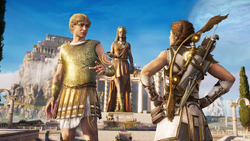
Hermes meeting Kassandra
During the Peloponnesian War, the misthios Kassandra, at the behest of Aletheia, visited a simulation of Elysium wherein a simulated version of Hermes could be found.[5]
Within this simulation, Hermes guided Kassandra in her efforts to strengthen her connection with the Staff of Hermes Trismegistus–which she had inherited from her birth father, Pythagoras–whilst supporting the reign of Persephone, for whom Hermes held great affection.[5]
Personality and characteristics
In Aletheia's simulation, Hermes was shown to be deeply in love with Persephone, unable to identify his own ruthless nature and always trying to keep his word. Being under Persephone's thrall made Hermes cruel, perfectionist, misanthropic, paranoid, ruthless, and tyrannical. Like the other Isu, he despised humans, considering them weak beings who should be governed, especially Adonis, who abhorred his own relationship with Aphrodite and for being the leader of the rebellion. However at the beginning Hermes pretended to get along with Kassandra since she was carrying his staff.
Legacy and Influence
During the late 5th century BCE, statues of Hermes were used all over the Peloponnese and the Greek islands as message boards on which bounties, contracts and other miscellanea were posted. Hermes was also worshipped on the island of Kephallonia, where a statue in his likeness stood inside the Drogarati Cave.[3] In addition, the a staff called Hermes' Kerukeion ended up in the possession of [Kassandra during the Peloponnesian War.[6]
In Egypt during the 1st century BCE, the citizens of Hermopolis replaced Thoth with Hermes in the Temple of Thoth. Berenike, the Nomarch of the Faiyum Oasis wrote a commendation to the temple, extending her thanks for embracing Hermes and promising they would be well compensated.[7]
Trivia
- Hermes is regarded as one of the Twelve Gods, the major deities of the Greek pantheon.
- While one and the same individual in lore, historically Hermes and Hermes Trismegistus are by-and-large considered seperate individuals, with Hermes Trismegistus being the purported author of the Hermetic Corpus, a series of sacred texts that are the basis of Hermeticism. That said, certain worshippers in Ptolemaic Egypt recognized an equivalence between Hermes (the god), Hermes Trismegistus, and Thoth.
Gallery
Appearances
- Assassin's Creed: Project Legacy (first appearance)
- Assassin's Creed: Origins (mentioned only)
- Assassin's Creed: Odyssey (statue only)
- The Fate of Atlantis: Fields of Elysium (simulation only)
References
- ↑ 1.0 1.1 Assassin's Creed: Odyssey – The Fate of Atlantis: Judgment of Atlantis / Isu codex: I.A.O.P. Cycle 44.160
- ↑ Assassin's Creed: Odyssey – The Fate of Atlantis
- ↑ 3.0 3.1 Assassin's Creed: Odyssey
- ↑ Assassin's Creed: Project Legacy – Divine Science: Chapter 2 – Kyros of Zarax
- ↑ 5.0 5.1 Assassin's Creed: Odyssey – The Fate of Atlantis: Fields of Elysium
- ↑ Assassin's Creed: Odyssey – Let My Patients Go
- ↑ Assassin's Creed: Origins
| ||||||||||||||||||||||||||||||||||


